Sir John Monash, Personal Files Book 14, 6 October - 30 November 1916, Part 5
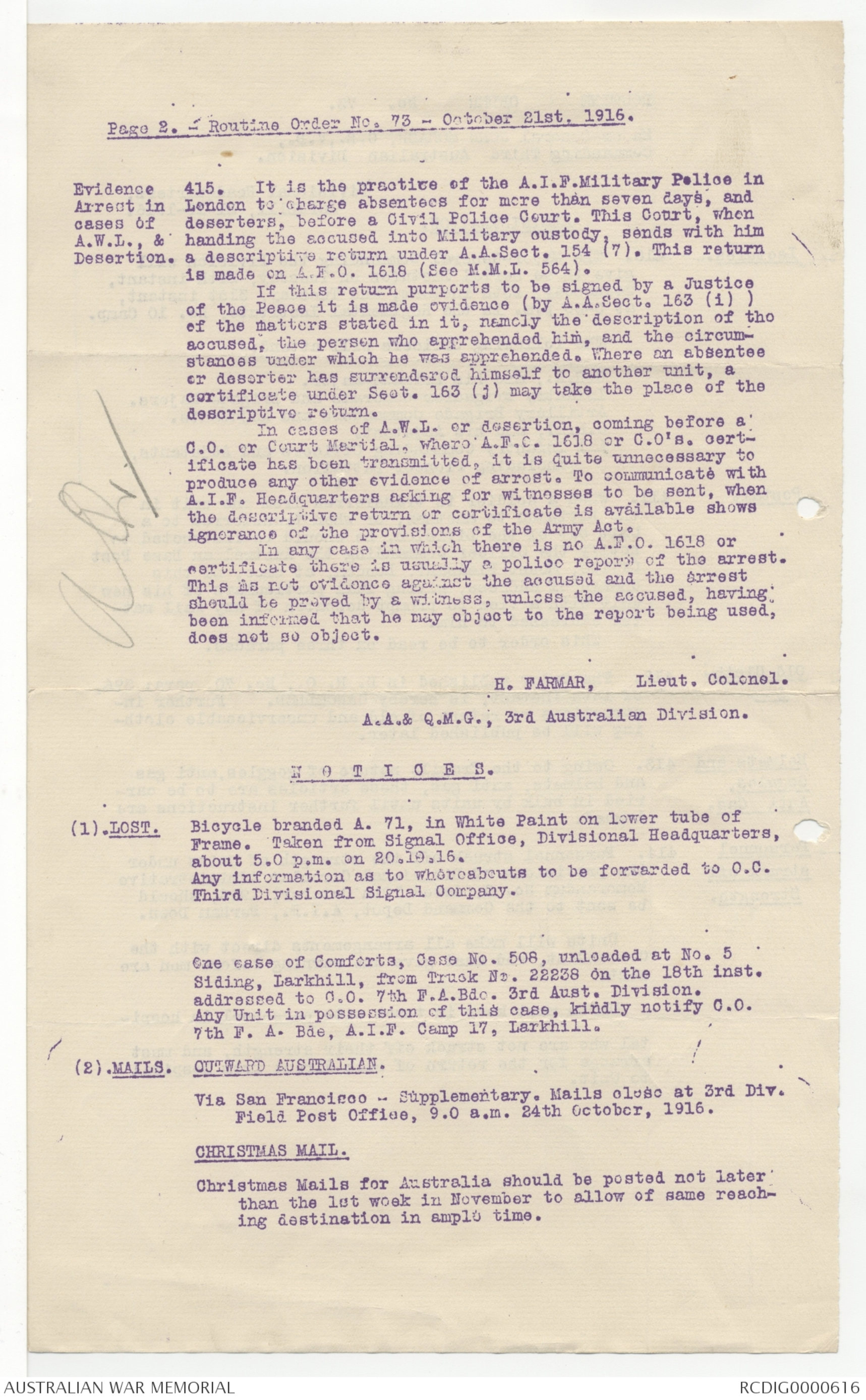
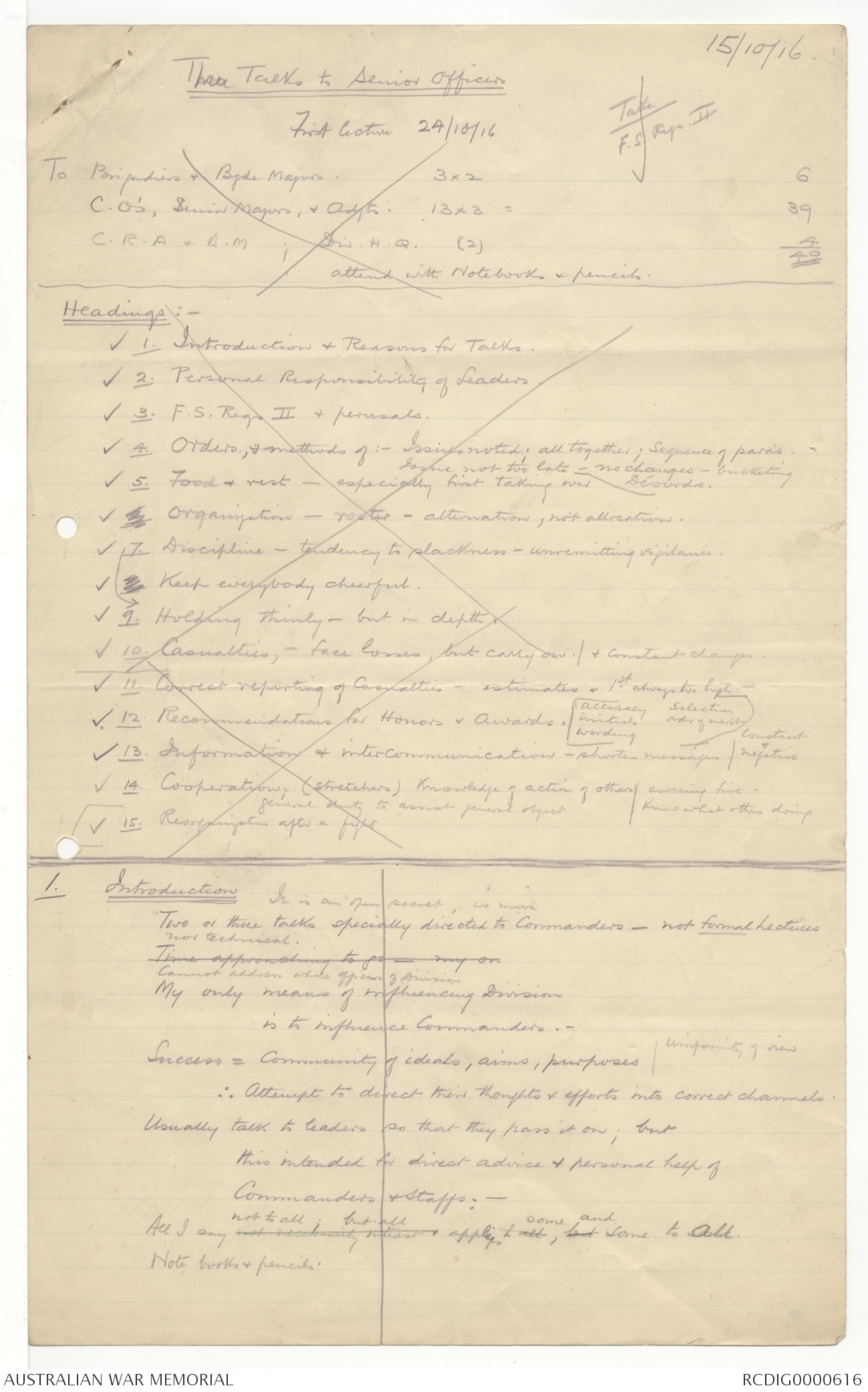
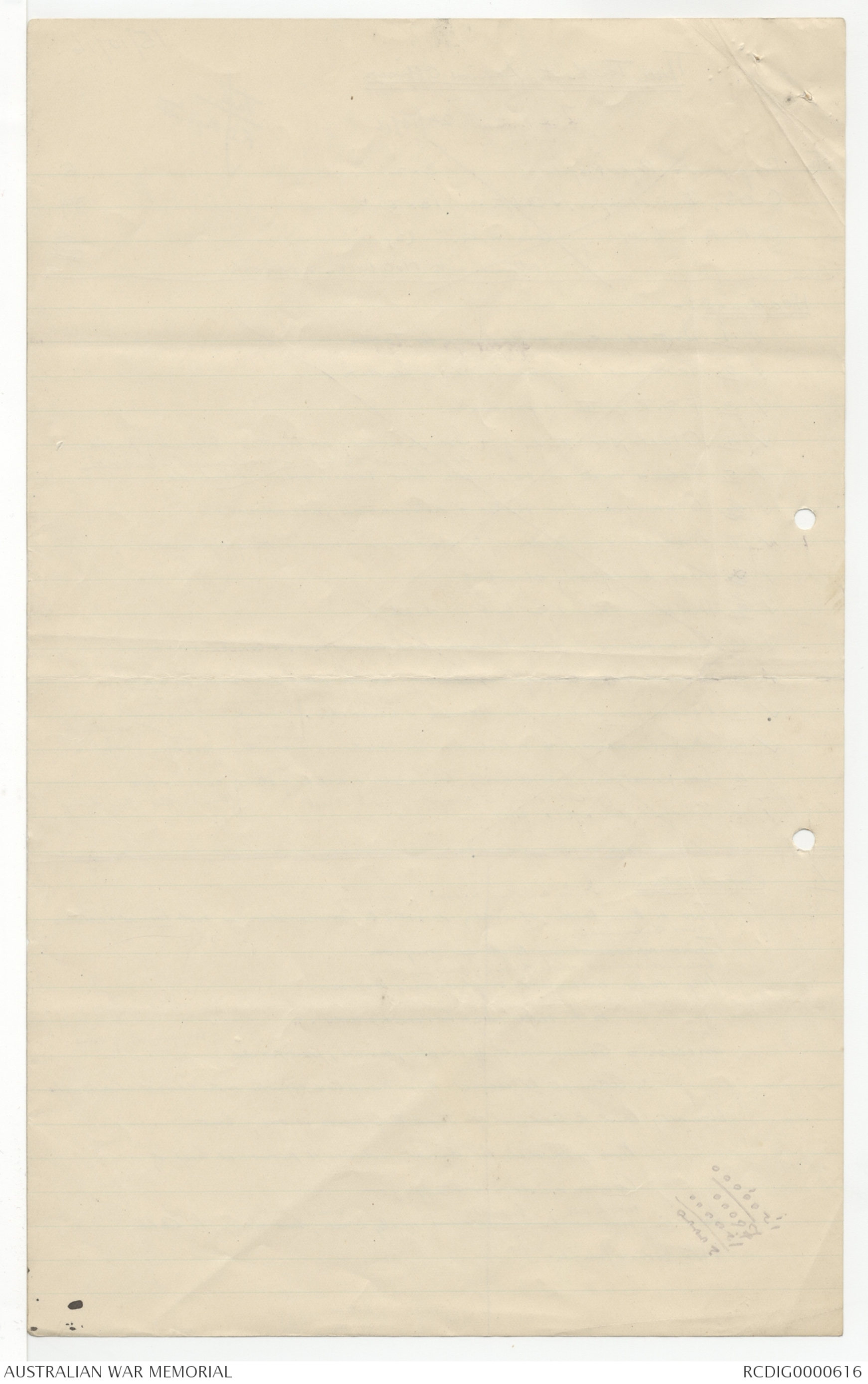
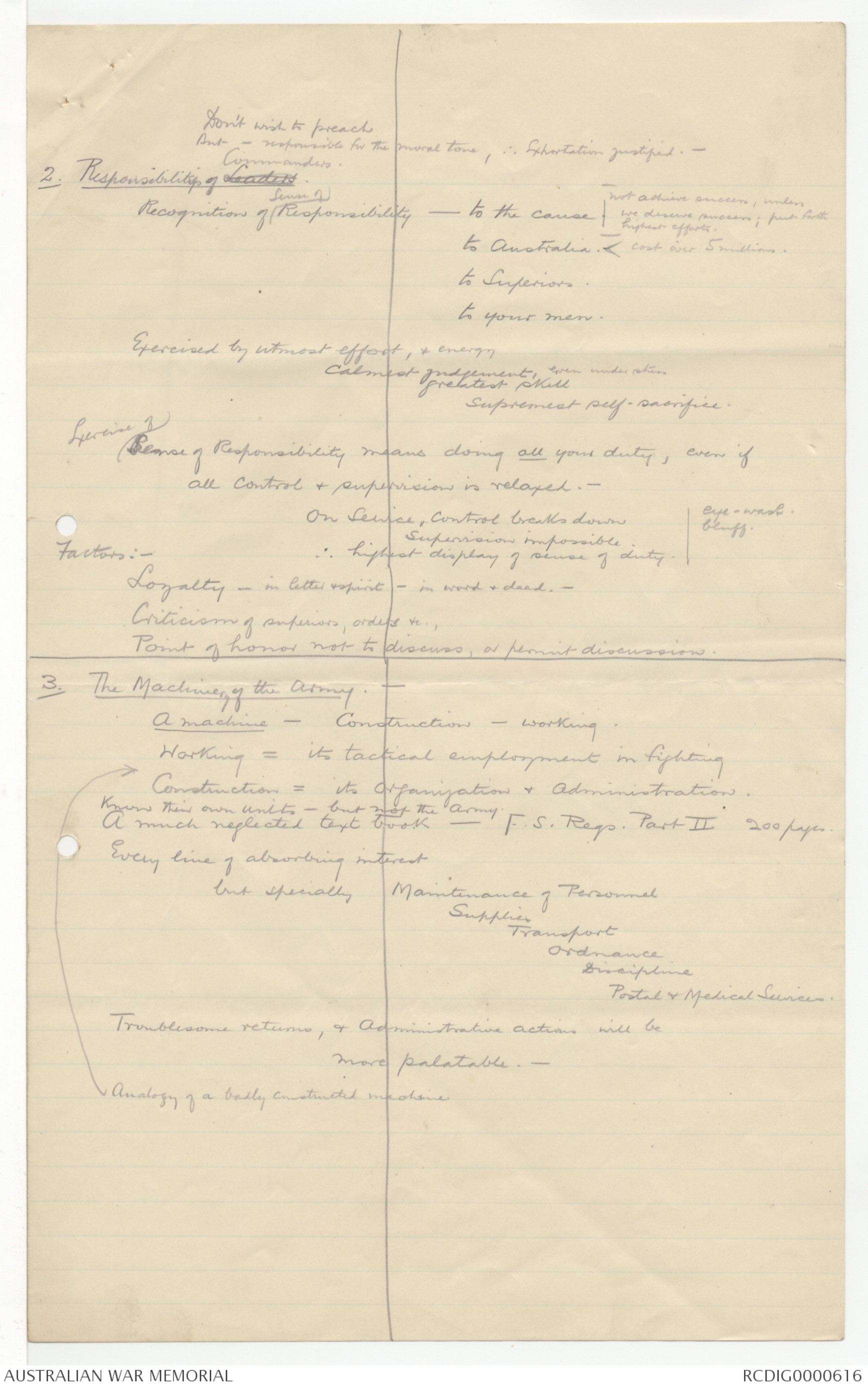
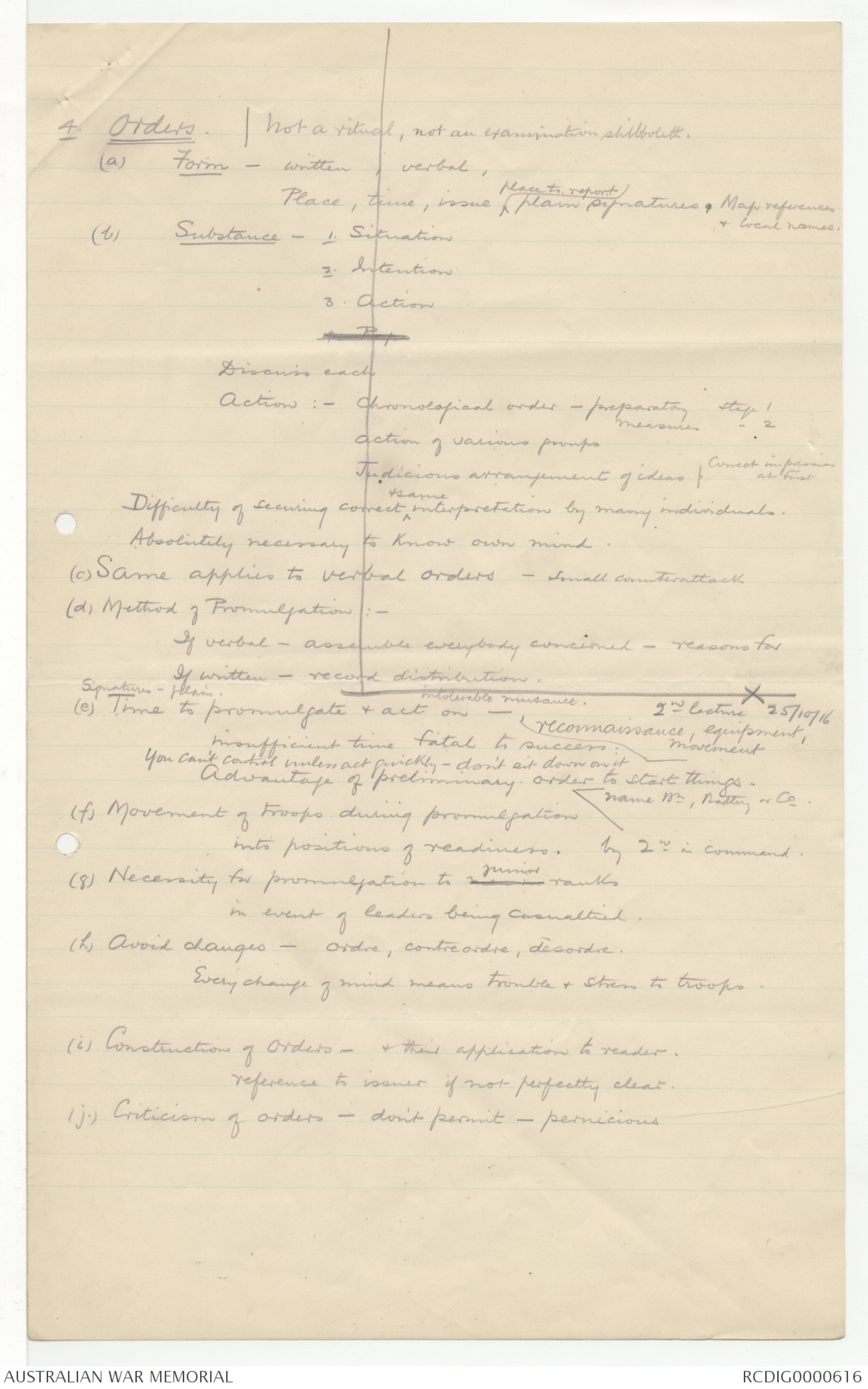
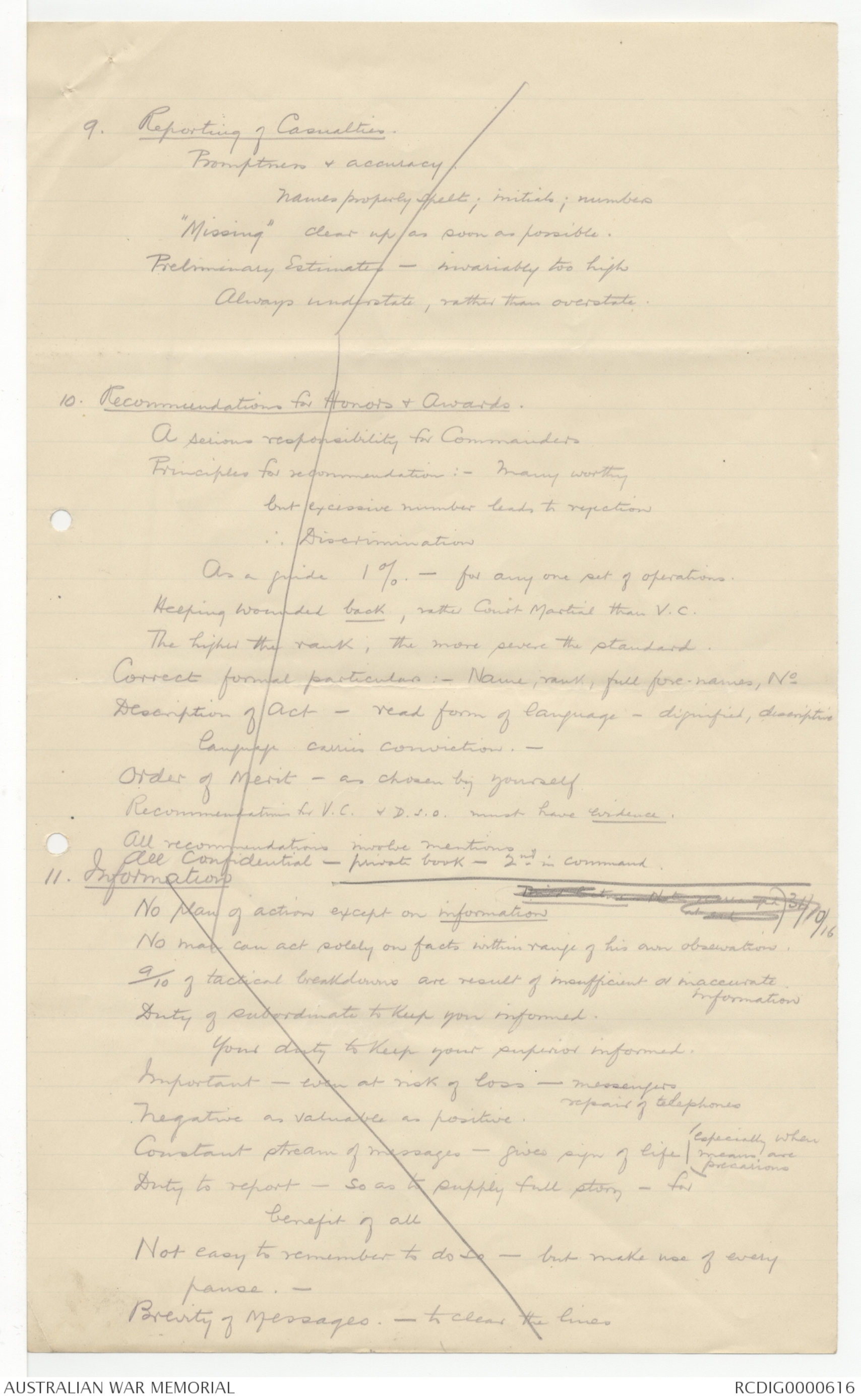
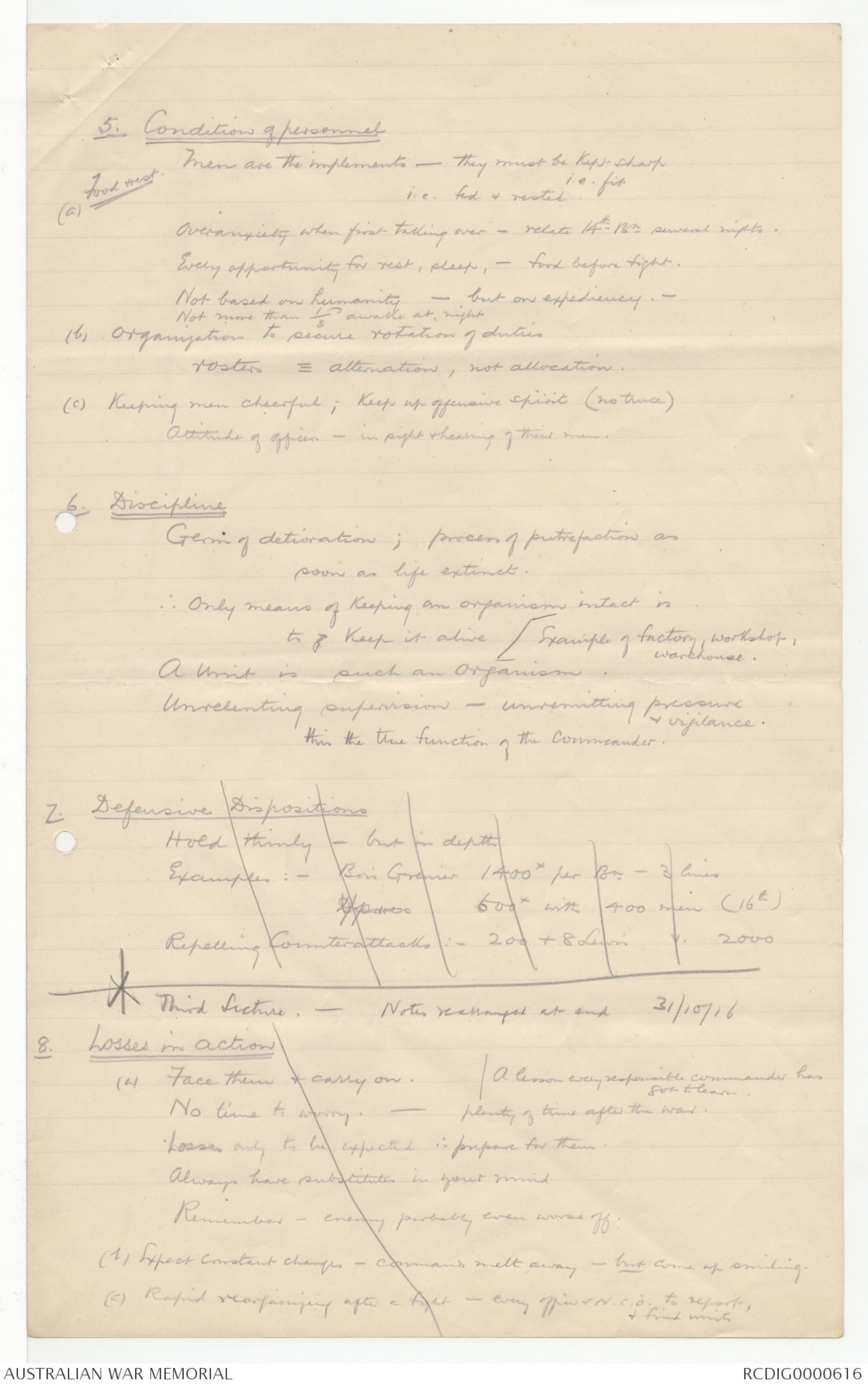
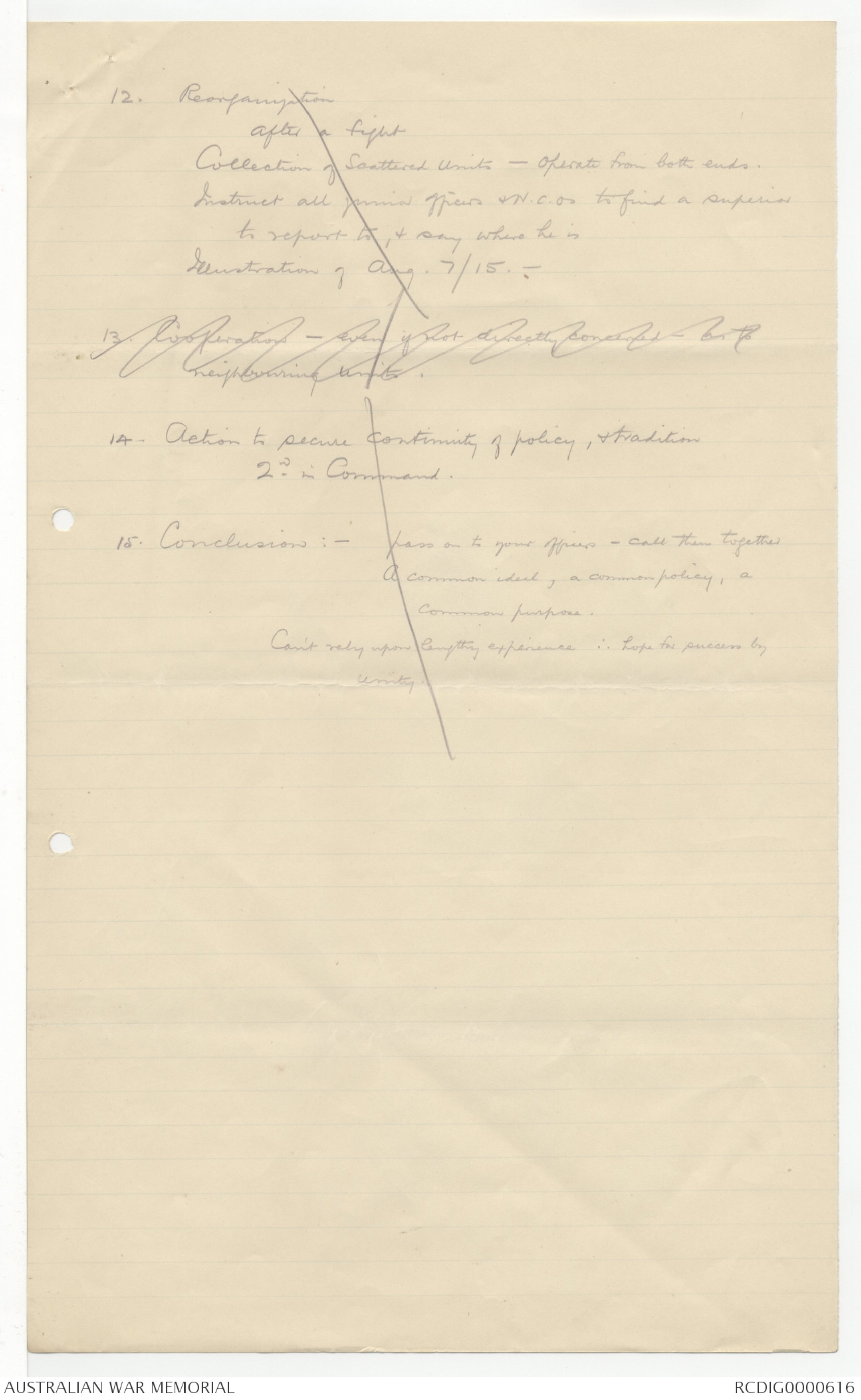
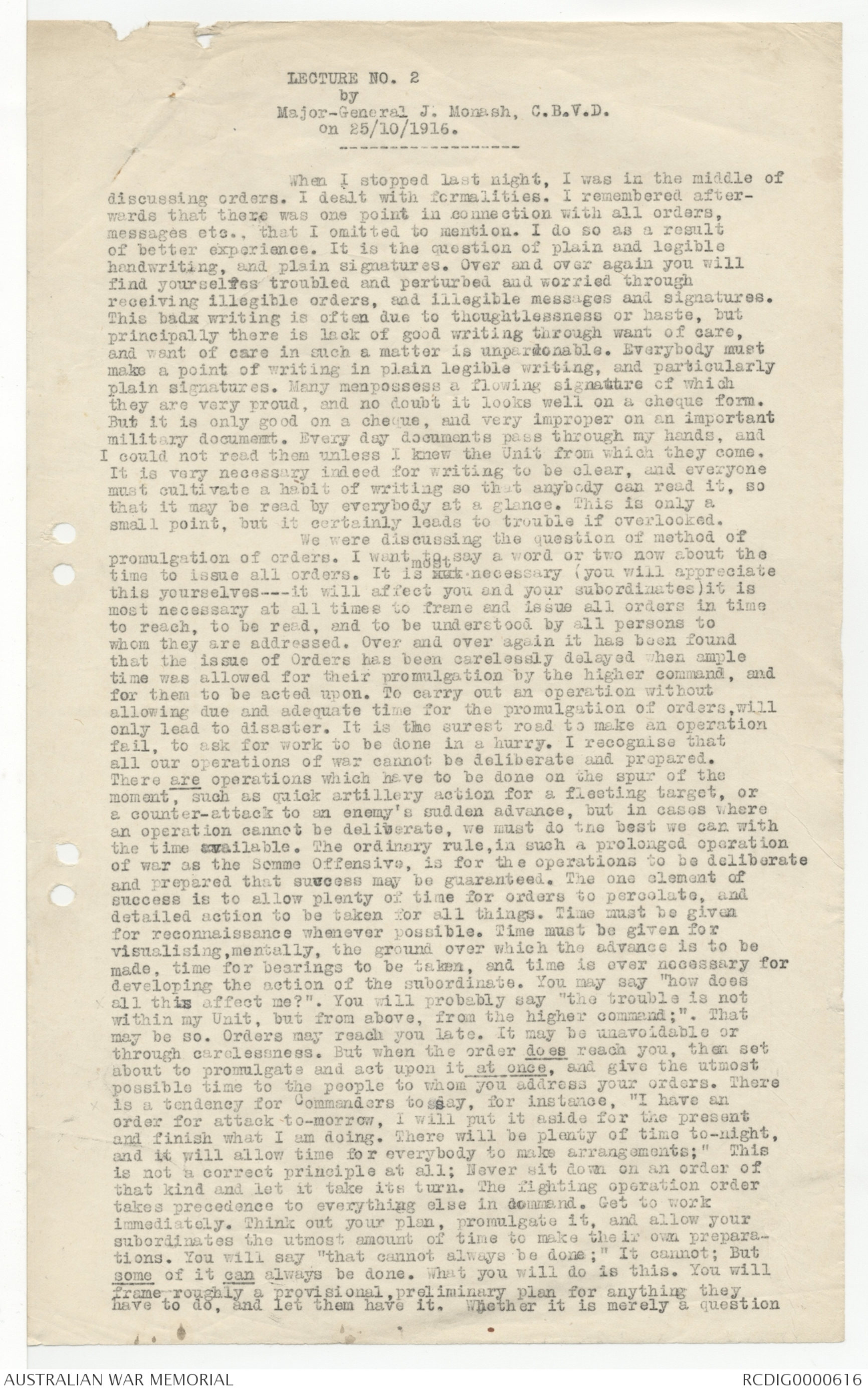
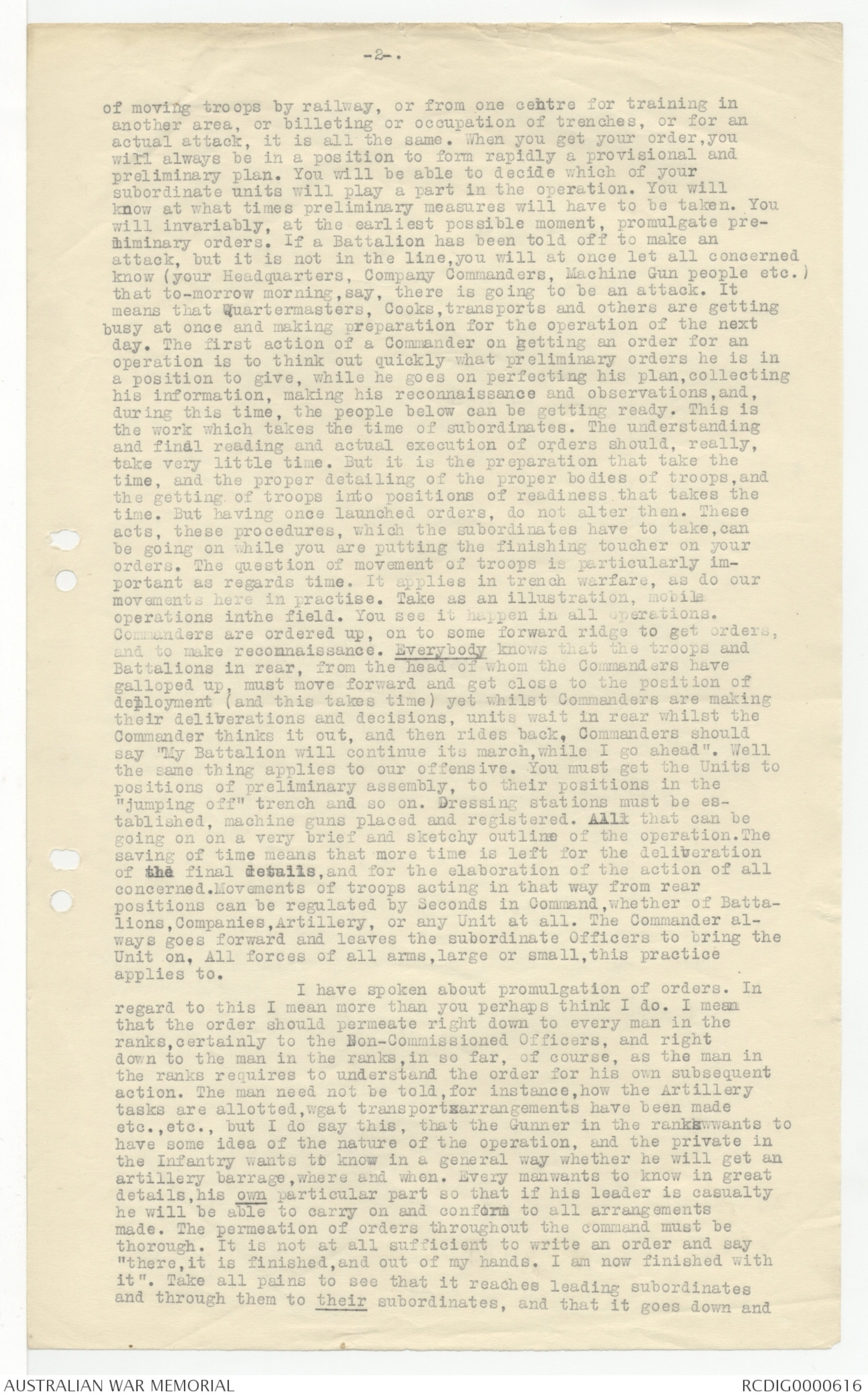
Page 2. - Routine Order No. 73 - October 21st. 1916.
Evidence Arrest in cases of A.W.L., & Desertion.
415. It is the practice of the A.I.F. Military Police in
London to charge absentees for more than seven days, and
deserters, before a Civil Police Court. This Court, when
handing the accused into Military custody, sends with him
a descriptive return under A.A.Sect. 154 (7). This return
is made on A.F.O. 1618 (See M.M.L. 564).
If this return purports to be signed by a Justice
of the Peace it is made evidence (by A.A.Sect. 163 (i) )
of the matters stated in it, namely the description of the
accused, the person who apprehended him, and the
circumstances under which he was apprehended. Where an absentee
or deserter has surrendered himself to another unit, a
certificate under Sect. 163 (j) may take the place of the
descriptive return.
In cases of A.W.L. or desertion, coming before a
C.O. or Court Martial, where A.F.O. 1618 or C.O's. certificate
has been transmitted, it is quite unnecessary to
produce any other evidence of arrest. To communicate with
A.I.F. Headquarters asking for witnesses to be sent, when
the descriptive return or certificate is available shows
ignorance of the provisions of the Army Act.
In any case in which there is no A.F.O. 1618 or
certificate there is usually a police report of the arrest.
This is not evidence against the accused and the arrest
should be proved by a witness, unless the accused, having
been informed that he may object to the report being used,
does not so object.
H. FARMAR, Lieut. Colonel.
A.A.& Q.M.G., 3rd Australian Division.
[*AQ*]
N O T I C E S.
(1). LOST. Bicycle branded A. 71, in White Paint on lower tube of
Frame. Taken from Signal Office, Divisional Headquarters,
about 5.0 p.m. on 20.10.16
Any information as to whereabouts to be forwarded to O.C.
Third Divisional Signal Company.
One case of Comforts, Case No. 508, unloaded at No. 5
Siding, Larkhill, from Truck No. 22238 on the 18th inst.
addressed to C.O. 7th F.A. Bde. 3rd Aust. Division.
Any Unit in possession of this case, kindly notify C.O.
7th F.A. Bde, A.I.F. Camp 17, Larkhill.
(2). MAILS. OUTWARD AUSTRALIAN.
Via San Francisco - Supplementary. Mails close at 3rd Div.
Field Post Office, 9.0 a.m. 24th October, 1916.
CHRISTMAS MAIL.
Christmas Mails for Australia should be posted not later
then the 1st week in November to allow of same reaching
destination in ample time.
15/10/16
Three Talks to Senior Officers
First lecture 24/10/16
To Brigadiers & Bgde Majors 3 x 2 6
C.O's, Senior Majors, & Adjts. 13 x 3 39
C.R.A. & A.M; Div H.Q. (2) 4
_____
49
attend with Notebooks & pencils
_____________________________________________________________
Headings :-
√ 1. Introduction & Reasons for Talks.
√ 2. Personal Responsibility of Leaders.
√ 3. F.S. Regs II & perusals.
√ 4. Orders, & methods of :- Issues noted; all together; sequence of paras.
Issue not too late - no changes - bucketing Désurdre.
√ 5. Food & rest - especially first taking over
√ X Organization - roster - alternation, not allocation.
√ 7. Discipline - tendency to slackness - unremitting vigilance.
√ X Keep everybody cheerful.
√ 9. Holding thinly - but in depth.
√ 10. Casualties, - face losses, but carry on. / & constant changes.
√ 11. Correct reporting of Casualties - estimates - 1st always too high -
√ 12. Recommendations for Honors & Awards. [accuracy initials wording Selection order of merit]
√ 13. Information & intercommunication - shorten messages / constant & negative
√ 14. Cooperation; (stretchers) Knowledge of action of others / covering fire. Know what others doing
General duty to assist general object
√ 15. Reorganization after a fight
____________________________________________________________________________
1. Introduction It is an open secret, we move
Two or three talks specially directed to Commanders - not formal Lectures
nor technical.Time approaching to go - my on
Cannot address whole officers of Division
My only means of influencing Division
is to influence Commanders. -
Success = Community of ideals, aims, purposes / uniformity of view
∴ Attempt to direct their thoughts & efforts into correct channels.
Usually talk to leaders so that they pass it on; but
this intended for direct advice & personal help of
Commanders & staffs :-
All I say not necessarily interest & not to all; but all applyies to ∧ some and all, but some to all.
Note books & pencils.
BLANK PAGE
Don't wish to preach
But - responsible for the moral tone, ∴ exhortation justified. -
2. Responsibility of Leaders Commanders.
Recognition of ∧ sense of Responsibility
- to the cause / not achieve success unless we deserve success; put forth highest efforts.
to Australia < cost over 5 millions.
to Superiors.
to your men.
Exercised by utmost effort, & energy
Calmest judgements, even under stress
greatest skill
Supremest self-sacrifice.
Exercise of Sense of Responsibility means doing all your duty, even if
all control & supervision is relaxed. -
On Service, control breaks down I eye-wash.
Supervision impossible. I bluff.
∴ highest display of sense of duty. I
Factors: -
Loyalty - in letter & spirit - in word & deed. -
Criticism of superiors, orders &c.,
Point of honor not to discuss, or permit discussion.
______________________________________________________________
3. The Machinery of the Army. -
A machine - Construction - working.
Working = its tactical employment in fighting
∧ Analogy of a badly constructed machine
Construction = its organization & Administration.
Know their own units - but not the Army.
A much neglected text book - F.S. Regs. Part II 200 pages.
Every line of absorbing interest
but specially Maintenance of Personnel
Supplies
Transport
Ordnance
Discipline
Postal & Medical Services
Troublesome returns, & Administrative actions will be
more palatable. -
4. Orders. / Not a ritual, not an examination shibboleth.
(a) Form - written, verbal,
Place, time, issue ∧ place to report plain signatures, Map references & local names.
(b) Substance -
1. Situation
2. Intention
3. Actionxxxxxxx
Discuss each
Action: - Chronological order - preparatory step 1
measures step 2
action of various groups
Judicious arrangement of ideas / Correct impression at first
Difficulty of securing correct ∧ & same interpretation by many individuals.
Absolutely necessary to know own mind.
(c) Same applies to verbal orders - small counterattack
(d) Method of Promulgation :-
If verbal - assemble everybody concerned - reasons for
If written - record distribution.
Signatures - plain.
intolerable nuisance.
2nd lecture 25/10/16
(e) Time to promulgate & act on -, reconnaissance, equipment, movement
insufficient time fatal to success:
You can't control unless act quickly - don't sit down on it
Advantage of preliminary order to start things.
∧ by 2nd in command.
name Bn, Battery or Co.
(f) Movement of troops during promulgation
into positions of readiness.
(g) Necessity for promulgation to xxxxxx junior ranks
in event of leaders being casualtied.
(h) Avoid changes - ordre, contreordre, désordre.
Every change of mind means trouble & stress to troops.
(i) Construction of Orders - & their application to reader.
reference to issuer if not perfectly clear.
(j) Criticism of orders - don't permit - pernicious
9. Reporting of Casualties.
Promptness & accuracy
names properly spelt; initials; numbers
"Missing" clear up as soon as possible.
Preliminary Estimates - invariably too high
Always understate, rather than overstate.
10. Recommendations for Honors & Awards.
A serious responsibility for Commanders
Principles for recommendation :- Many worthy
but excessive number leads to rejection
∴ Discrimination
As a guide 1% - for any one set of operations.
Helping wounded back, rather Court Martial than V.C.
The higher the rank, the more severe the standard.
Correct formal particulars :- Name, rank, full fore-names, No
Description of Act - read form of language - dignified, descriptive
language carries conviction. -
Order of Merit - as chosen by yourself
Recommendation for V.C. & D.S.O. must have evidence.
All recommendations involve mentions
All Confidential - private book - 2nd in command.xxxx Notes xxxxxx 31/10/16
11. Information
No plan of action except on information
No man can act solely on facts within range of his own observation.
9/10 of tactical breakdowns are result of insufficient or inaccurate information.
Duty of subordinate to keep you informed.
Your duty to keep your superior informed.
Important - even at risk of loss - messengers
repair of telephones
Negative as valuable as positive.
Constant stream of messages - gives sign of life / especially when means are precarious
Duty to report - so as to supply full story - for
benefit of all
Not easy to remember to do so - but make use of every
pause. -
Brevity of Messages - to clear the lines
5. Conditions of personnel
Men are implements - they must be kept sharp
[*Food & rest*]
i.e. fit
i.e. fed and rested.
(a) overanxiety when first taking over - relate 14th Bn several nights.
Every opportunity for rest, sleep, - food before fight.
Not based on humanity - but on expediency. -
Not more than 1/3 awake at night
(b) Organization to secure rotation of duties
rosters = alternation, not allocation.
(c) Keeping men cheerful; Keep up offensive spirit (no truce)
Attitude of officers - in sight & hearing of their men.
6. Discipline
Germ of detioration; process of putrefaction as
soon as life extinct.
∴ Only means of keeping an organism intact is
to g keep it alive [Example of factory, workshop, warehouse.
A unit is such an organism.
Unrelenting supervisioin - unremitting pressure & vigilance.
this the true function of the Commander.
7. Defensive Dispositions
Hold thinly - but in depth
Examples: - Bois Grenier 1400x per Bn - 3 lines
[[Ypres?]] 600x with 400 men (16th)
Repelling Counterattacks :- 200 + 8 Lewis v. 2000X _______________________________________________
Third Lecture. - Notes rearranged at end 31/10/16
8. Losses in action
(a) Face them & carry on. / A lesson every responsible commander has
got to learn.
No time to worry. - plenty of time after the war.
Losses only to be expected ∴ prepare for them.
Always have substitutes in your mind
Remember - enemy probably even worse off.
(b) Expect constant changes - commands melt away - but come up smiling.
(c) Rapid reorganizing after a fight - every officer & N.C.O. to report,
& find units
12. Reorganization
after a fight
Collection of Scattered Units - operate from both ends.
Instruct all junior officers & N.C.Os to find a superior
to report to, & say where he is
Illustration of Aug. 7/15. - 13. Cooperation - even if not directly concerned - as to neighbouring units.
14. Action to secure continuity of policy, & tradition
2nd in Command.
15. Conclusion: - pass on to your officers - call them together
A common ideal, a common policy, a
common purpose.
Can't rely upon lengthy experience ∴ hope for success by
unity.
LECTURE NO. 2
by
Major-General J. Monash, C.B.V.D.
on 25 / 10 / 1916.
-------------------------
When I stopped last night, I was in the middle of
discussing orders. I dealt with formalities. I remembered afterwards
that there was one point in connection with all orders,
messages etc., that I omitted to mention. I do so as a result
of better experience. It is the question of plain and legible
handwriting, and plain signatures. Over and over again you will
find yourselves troubled and perturbed and worried through
receiving illegible orders, and illegible messages and signatures.
this badx writing is often due to thoughtlessness or haste, but
principally there is lack of good writing through want of care,
and want of care in such a matter is unpardonable. Everybody must
make a point of writing in plain legible writing, and particularly
plain signatures. Many menpossess a flowing signature of which
they are very proud , and no doubt it looks well on a cheque form.
But it is only good on a cheque, and very improper on an important
military document. Every day documents pass through my hands, and
I could not read them unless I knew the Unit from which they come .
It is very necessary indeed for writing to be clear, and everyone
must cultivate a habit of writing so that anybody can read it, so
that it may be read by everybody at a glance. This is only a
small point, but it certainly leads to trouble if overlooked.
We were discussing the question of method of
promulgation of orders. I want to say a word or two now about the
time to issue all orders. It is most not necessary (you will appreciate
this yourselves --- it will affect you and your subordinates) it is
most necessary at all times to frame and issue all orders in time
to reach, to be read, and to be understood by all persons to
whom they are addressed. Over and over again it has been found
that the issue of Orders has been carelessly delayed when ample
time was allowed for their promulgation by the higher command, and
for them to be acted upon. To carry out an operation without
allowing due and adequate time for the promulgation of orders, will
only lead to disaster. It is the surest road to make an operation
fail, to ask for work to be done in a hurry. I recognise that
all our operations of war cannot be deliberate and prepared.
There are operations which have to be done on the spur of the
moment, such as quick artillery action for a fleeting target, or
a counter-attack to an enemy's sudden advance, but in cases where
an operation cannot be deliberate we must do the best we can with
the time available. The ordinary rule , in such a prolonged operation
of war as the Somme Offensive, is for the operations to be deliberate
and prepared that success may be guaranteed. The one element of
success is to allow plenty of time for orders to percolate, and
detailed action to be taken for all things. Time must be given for
visualising ,mentally, the ground over which the advance is to be
made, time for bearings to be taken, and time is ever necessary for
developing the action of the subordinate. You may say "how does
all this affect me?". You will probably say "the trouble is not
within my Unit, but from above, from the higher command;". That
may be so. Orders may reach you late. It may be unavoidable or
through carelessness. But when the order does reach you, then set
about to promulgate and act upon it at once, and give the utmost
possible time to the people to whom you address your orders. There
is a tendency for Commanders to say, for instance, "I have an
order for attack to-morrow, I will put it aside for the present
and finish what I am doing. There will be plenty of time to-night,
and it will allow time for everybody to make arrangements;" This
is not a correct principle at all; Never sit down on an order of
that kind and let it take its turn. The fighting operation order
takes precedence to everything else in command. Get to work
immediately. Think out your plan , promulgate it, and allow your
subordinates the utmost amount of time to make their own preparations.
You will say "that cannot always be done ; " it cannot ; But
some of it can always be done. What you will do is this. You will
frame roughly a provisional, preliminary plan for anything they
have to do, and let them have it. Whether it is merely a question
-2- .
of moving troops by railway, or from one centre for training in
another area, or billeting or occupation of trenches, or for an
actual attack, it is all the same. When you get your order , you
will always be in a position to form rapidly a provisional and
preliminary plan. You will be able to decide which of your
subordinate units will play a part in the operation. You will
know at what times preliminary measures will have to be taken. You
will invariably, at the earliest possible moment , promulgate preliminary
orders. If a Battalion has been told off to make an
attack, but it is not in the line,you will at once let all concerned
know (your Headquarters, Company Commanders, Machine Gun people etc. )
that to-morrow morning ,say , there is going to be an attack. It
means that Quartermasters, Cooks, transports and others are getting
busy at once and making preparation for the operation of the next
day. The first action of a Commander on getting an order for an
operation is to think out quickly what preliminary orders he is in
a position to give, while he goes on perfecting his plan, collecting
his information, making his reconnaissance and observations ,and ,
during this time, the people below can be getting ready. This is
the work which takes the time of subordinates. The understanding
and final reading and actual execution of orders should, really,
take very little time. But is is the preparation that take the
time, and the proper detailing of the proper bodies of troops ,and
the getting of troops into positions of readiness that takes the
time. But having once launched orders, do not alter then. These
acts, these procedures, which the subordinates have to take , can
be going on while you are putting the finishing toucher on your
orders. The question of movement of troops is particularly important
as regards time. It applies in trench warfare, as do our
movements here in practise. Take as an illustration, mobile
operations inthe field. You see it happen in all operations.
Commanders are ordered up, on to some forward ridge to get orders,
and to make reconnaissance. Everybody knows that the troops and
Battalions in rear, from the head of whom the Commanders have
galloped up, must move forward and get close to the position of
deployment (and this takes time) yet whilst Commanders are making
their deliberations and decisions, units wait in rear whilst the
Commander thinks it out, and then rides back. Commanders should
say "My Battalion will continue its march, while I go ahead". Well
the same thing applies to our offensive. You must get the Units to
positions of preliminary assembly, to their positions in the
"jumping off" trench and so on. Dressing stations must be established,
machine guns placed and registered. Allx that can be
going on on a very brief and sketchy outline of the operation.The
saving of time means that more time is left for the deliberation
of the final details, and for the elaboration of the action of all
concerned.Movements of troops acting in that way from rear
positions can be regulated by Seconds in Command ,whether of Battalions,
Companies ,Artillery, or any Unit at all. The Commander always
goes forward and leaves the subordinate Officers to bring the
Unit on. All forces of all arms , large or small, this practice
applies to.
I have spoken about promulgation of orders. In
regard to this I mean more than you perhaps think I do. I mean
that the order should permeate right down to every man in the
ranks, certainly to the Non-Commissioned Officers, and right
down to the man in the ranks , in so far, of course , as the man in
the ranks requires to understand the order for his own subsequent
action. The man need not be told , for instance, how the Artillery
tasks are allotted, wgat transportxarrangements have been made
etc., etc., but I do say this, that the Gunner in the ranks wants to
have some idea of the nature of the operation, and the private in
the Infantry wants to know in a general way whether he will get an
artillery barrage, where and when. Every manwants to know in great
details,his own particular part so that if his leader is casualty
he will be able to carry on and conform to all arrangements
made. The permeation of orders throughout the command must be
thorough. It is not at all sufficient to write an order and say
"there, it is finished,and out of my hands. I am now finished with
it". Take all pains to see that it reaches leading subordinates
and through them to their subordinates, and that it goes down and
 Sam scott
Sam scottThis transcription item is now locked to you for editing. To release the lock either Save your changes or Cancel.
This lock will be automatically released after 60 minutes of inactivity.